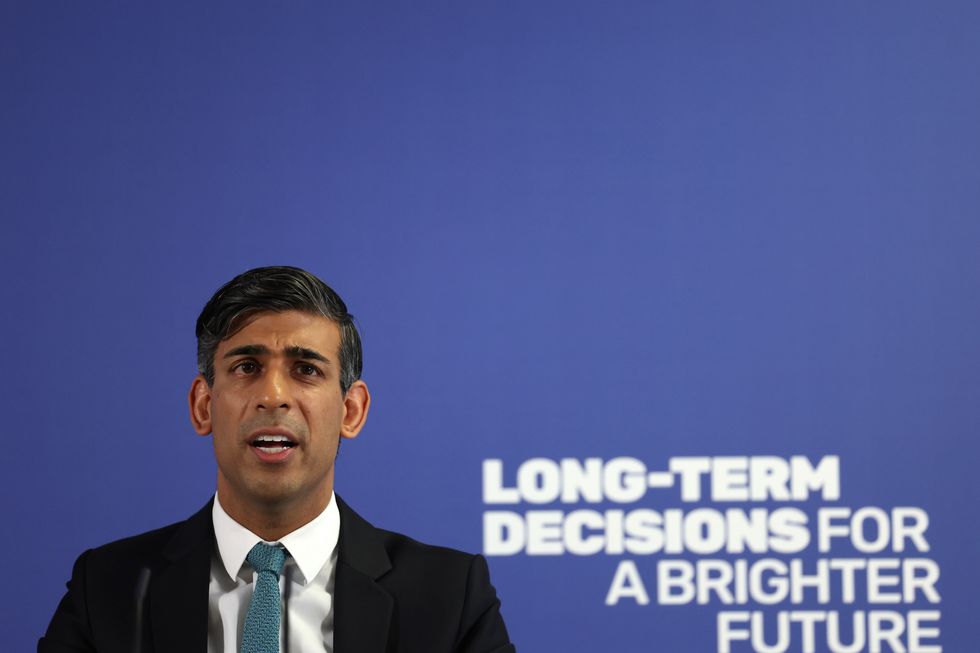Universal Credit changes will reportedly come into force from 2025
PA
The Treasury announced strict new rules on sanctions and the potential closure of Universal Credit claims last week ahead of the Autumn Statement
Don't Miss
Most Read
Latest
Prime Minister Rishi Sunak has vowed to "end the national scandal" of two million people being out of work, by forcing more benefits recipients to look for jobs.
In plans set to be announced in the Autumn Statement, hundreds of thousands of people with mobility and mental health problems will be told they must look for work that they can do from home.
These people will face having their benefits cut by £4,680 a year, as ministers insist they are no longer incapable of working, insisting they can work from home.
The changes will apply to all new claimants from 2025.
WATCH NOW: GB News' Christopher Hope on Sunak's benefits clampdown
Existing claimants will be given a guarantee that they won't have their right to benefits assessed if they look for work.
Addressing plans to overhaul benefits during a speech in north London on Monday, Mr Sunak said: “We believe in the inherent dignity of a good job. And we believe that work, not welfare, is the best route out of poverty.
“Yet right now, around two million people of working age are not working at all.
"That is a national scandal and an enormous waste of human potential. So, we must do more to support those who can work to do so.
“And we will clamp down on welfare fraudsters, because the system must be fair for the taxpayers who fund it. By doing all of this, by getting people off welfare and into work, we can better support those genuinely in need of a safety net.”
Ministers argue that people who struggled to leave the house are no longer unable to work as more employers offer the option of working from home.
The Treasury announced details about Chancellor Jeremy Hunt and the Secretary of State for Work and Pensions Mel Stride's Back to Work Plan as part of the Autumn Statement announcements last week.
As part of the measures, the Department for Work and Pensions (DWP) will enforce stricter benefit sanctions for people deemed able to work but who "refuse to engage with their Jobcentre or take on work offered to them".
The Treasury said benefit claimants who "continue to refuse to engage" with the Jobcentre will face having their claim closed.
The Government says under its new Universal Credit rules, no claimant should reach 18 months of unemployment in receipt of their full benefits if they haven't taken every "reasonable step to comply" with Jobcentre support.
Chancellor Jeremy Hunt, said: "We’re serious about growing our economy and that means we must address the rise in people who aren’t looking for work – especially because we know so many of them want to and with almost a million vacancies in the jobs market the opportunities are there.
“These changes mean there’s help and support for everyone – but for those who refuse it, there are consequences too. Anyone choosing to coast on the hard work of taxpayers will lose their benefits.”
LATEST DEVELOPMENTS:

Rishi Sunak delivered a speech in north London
PA
Secretary of State for Work and Pensions, Mel Stride, said: “We are rolling out the next generation of welfare reforms to help more people start, stay and succeed in work. We know the positive impact work can have, not just on our finances, but our health and wellbeing too.
“So we are expanding the voluntary support for people with health conditions and disabilities, including our flagship Universal Support programme.
“But our message is clear: if you are fit, if you refuse to work, if you are taking taxpayers for a ride – we will take your benefits away.”
However, Thomas Lawson, CEO of national anti-poverty charity Turn2us, said: "The Government is undermining the positive aspects of this plan by putting such a strong emphasis on the punishments people will receive if they don’t find work within the stricter parameters being set.
"If they are serious about getting people back into long-term sustainable work they need to improve trust with the people who could benefit most from the support on offer.
"People who contact Turn2us tell us the welfare system already feels punitive. The Government's own evidence shows sanctions don’t work, so why is it increasing the use of them? Widespread research shows sanctions worsen people’s mental health problems and plunge families, including children, into more severe hardship.
"If the Government wants to succeed in supporting people and families who will be most affected by this plan, an approach of far more understanding, dignity and respect is the way forward."













